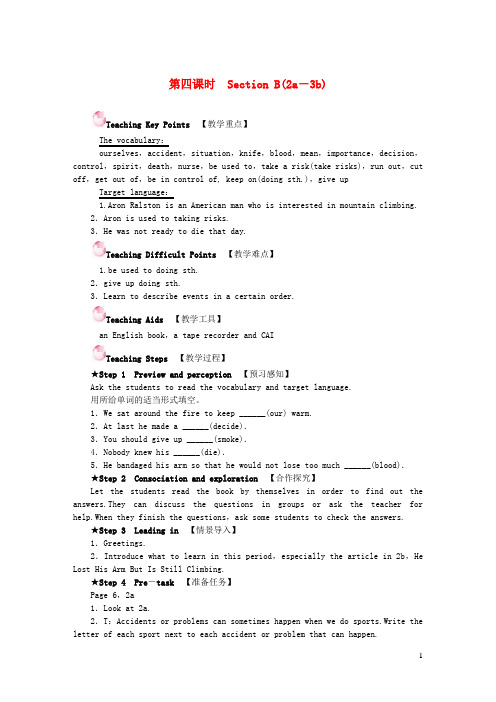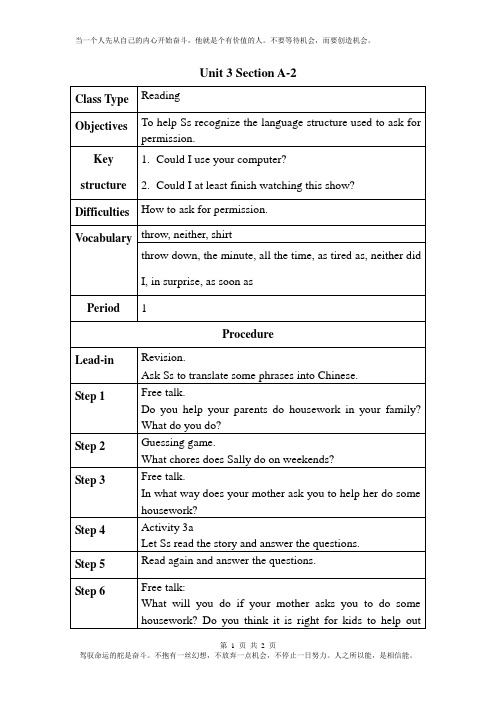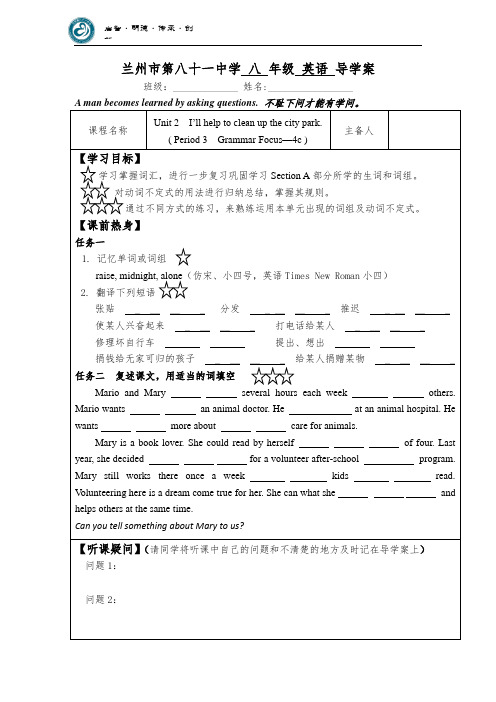八年级英语上册 Unit 2 What’s the matter Period 2 Section A 3a-4导学案
- 格式:doc
- 大小:29.00 KB
- 文档页数:2

八年级上册英语教案人教版八年级英语教案【篇一】八年级上册英语教案2022年新目标英语八年级上全册教案2022年下期八年级英语全册教案(人教版)Unit 1 Where did you go on vacation?Section A 1 (1a-2d)一、教学目标:1. 语言知识目标:1) 能掌握以下单词:anyone, anywhere, wonderful, quite a few, most, something, nothing, everyone, of course, myself, yourself能掌握以下句型:① —Where did you go on vacation? —I went to the mountains.② —Where did Tina to on vacation? —She went to the beach.③ —Did you go with anyone?2) 能了解以下语法:—复合不定代词someone, anyone, something, anything等的用法。
—yourself, myself等反身代词的用法。
3)一般过去时态的特殊疑问句,一般疑问句及其肯定、否定回答。
2. 情感态度价值观目标:学会用一般过去时进行信息交流,培养学生的环保意识,热爱大自然。
二、教学重难点1. 教学重点:1) 用所学的功能语言交流假期去了什么旅行。
2) 掌握本课时出现的新词汇。
2. 教学难点:1) 复合不定代词someone, anyone, something, anything等的用法。
2) yourself, myself等反身代词的用法。
三、教学过程Ⅰ. Lead-in1. 看动画片来进入本课时的主题谈论上周末做了些什么事情,谈论过去发生的事情。
Ⅱ. Presentation1. Show some pictures on the big screen. Let Ss read the expressions.2. Focus attention on the picture. Ask: What can you see? Say: Each picture shows —Yes, I did./No, I didn’t.something a person did in the past. Name each activity and ask students to repeat: Stayed at home, Went to mountains, went to New York City 6. Went to the beach, visited my uncle, visited museums, went to summer camp3. Now, please match each phrase with one of the pictures next to the name of the activity,point to the sample answer.4. Check the answers. Answers: 1. f 2. b 3. g 4. e5. c6. a7. d III. Listening1. Point to the picture on the screen.Say: Look at the picture A. Where did Tina go on vacation? She went to mountains. Ask: What did the person do in each picture?2. Play the recording the first time.3. Play the recording a second time.Say: There are three conversations. The people talk about what did on vacation. Listen to the recording and write numbers of the namesin the right boxes of the picture.4. Check the answers.IV.Pair work1. Point out the sample conversation. Ask two Ss to read the conversation to the class.2. Now work with a partner. Make your own conversation about the people in the picture.3. Ss work in pairs. As they talk, move around the classroom and give any help they need.4. Let some pairs act out their conversations.V. Listening1. Tell Ss they will hear a conversation about three students’ conversations. Listen for the first time and fill in the chart. Then listen again and check Yes, or No.2. Let Ss read the phrases in the chart of 2b.3. Play the recording the first time. Ss listen and fill in the chart.4. Play the recording a second time for the Ss to check “Yes, I did.” or “No, I didn’t. ”5. Check the answers with the Ss.VI. Pair work1. Let two Ss read the conversation between Grace, Kevin and Julie.2. Let Ss work in pairs and try to role-play the conversation.3. Ask some pairs to act out their conversations.VII. Role-play1. First let Ss read the conversation and match the people and places they went.2. Let Ss act out the conversations in pairs.3. Some explanations in 2d.Homework:用英语询问你的一位好朋友,她(他)假期去了哪里?看到了什么?并将此对话写在作业上。

第四课时Section B(2a-3b)Teaching Key Points【教学重点】The vocabulary:ourselves,accident,situation,knife,blood,mean,importance,decision,control,spirit,death,nurse,be used to,take a risk(take risks),run out,cut off,get out of,be in control of, keep on(doing sth.),give upTarget language:1.Aron Ralston is an American man who is interested in mountain climbing.2.Aron is used to taking risks.3.He was not ready to die that day.Teaching Difficult Points【教学难点】1.be used to doing sth.2.give up doing sth.3.Learn to describe events in a certain order.Teaching Aids【教学工具】an English book,a tape recorder and CAITeaching Steps【教学过程】★Step 1Preview and perception【预习感知】Ask the students to read the vocabulary and target language.用所给单词的适当形式填空。
1.We sat around the fire to keep ______(our) warm.2.At last he made a ______(decide).3.You should give up ______(smoke).4.Nobody knew his ______(die).5.He bandaged his arm so that he would not lose too much ______(blood).★Step 2Consociation and exploration【合作探究】Let the students read the book by themselves in order to find out the answers.They can discuss the questions in groups or ask the teacher for help.When they finish the questions,ask some students to check the answers.★Step 3Leading in【情景导入】1.Greetings.2.Introduce what to learn in this period,especially the article in 2b,He Lost His Arm But Is Still Climbing.★Step 4Pre-task【准备任务】Page 6,2a1.Look at 2a.2.T:Accidents or problems can sometimes happen when we do sports.Write the letter of each sport next to each accident or problem that can happen.3.Ask the students to talk about what we should do when the accidents or problems happen.4.Practice the conversations in pairs.5.Ask some pairs to act it out.★Step 5While-task【过程任务】Page 6,2b1.Present these new words on the screen and teach the new words.2.Ask students to repeat them.And make sure everyone knows the meanings.3.Write the words you don't know the meanings in the box.And then look up the words in the dictionary.Writers describe events in a certain order.Finding the order of events will help you understand what you are reading.4.Practice reading the passage.5.Page 7,2c & 2d(1)Read the passage again.And circle True,False or Don't Know.(2)If they can't find the answers,they can discuss in groups or ask the teacher for help.(3)Ask one or two students to check the answers.(4)Ask the students to read the passage quickly and find the answers in 2d.★Step 6Post-task【后续任务】Page 7,2e1.Ask the students to put the sentences in the correct order.Then use them to tell Aron's story to the partner.2.Try to add other details from the reading.3.Page 7,3a(1) Look at the accident or health problem.(2) Imagine you are the school nurse and a student just had an accident or a health problem.Make notes about what he /she should and shouldn't do.Discuss them in groups.4.Page 8,3b(1)Look at the questions and the phrases in the box.(2)Ask the students to read and practice the questions and the phrases in the box.★Step 7Consolidation practice【巩固练习】Look at the students' book of the 4th exercise.★Step 8Summary【课堂小结】In this class we have learned a passage.We should master it.And we should master the new phrases “be used to,take a risk(take risks),run out,cut off,get out of,be in control of, keep on(doing sth.),give up”,too.★Step 9Homework【家庭作业】1.Write a strange event after class.2.Retell the story about Aron Ralston.Board Design板书设计Unit 1What's the matter?The fourth period Section B(2a-3b)1.Key words:ourselves,accident,situation,knife,blood,mean,importance,decision,control,spirit,death,nurse2.Key phrases:be used to,take a risk(take risks),run out,cut off,get out of,be in control of,keep on(doing sth.),give up3.Key sentences:(1)Aron Ralston is an American man who is interested in mountain climbing.(2)Aron is used to taking risks.(3)He was not ready to die that day.Unit 4 What’s the best movie theaterSection A (Grammar Focus-3c)Ⅰ.根据句意及汉语提示填写单词。

Unit 3 Section A-2Class Type ReadingObjectives To help Ss recognize the language structure used to ask for permission.Key structure 1.Could I use your computer?2.Could I at least finish watching this show?Difficulties How to ask for permission.Vocabulary throw, neither, shirtthrow down, the minute, all the time, as tired as, neither didI, in surprise, as soon asPeriod 1ProcedureLead-in Revision.Ask Ss to translate some phrases into Chinese.Step 1 Free talk.Do you help your parents do housework in your family?What do you do?Step 2 Guessing game.What chores does Sally do on weekends?Step 3 Free talk.In what way does your mother ask you to help her do somehousework?Step 4 Activity 3aLet Ss read the story and answer the questions.Step 5 Read again and answer the questions.Step 6 Free talk:What will you do if your mother asks you to do somehousework? Do you think it is right for kids to help outwith housework? Why or why not? Give your reasons. Step 7 Activity 3b.Read the sentences below. Underline the sentences from thereading that mean the same thing.Step 8 Activity 3c.Decide whether the underlined words in the sentences areverbs or nouns. Then write another sentence using theunderlined word in the other form.Step 9 Language points: explain the key words and phrases in section A-2.。



兰州市第八十一中学八年级英语导学案班级:_____________ 姓名:_________________课程名称Unit 2 I’ll help to clean up the city park.( Period 3 Grammar Focus—4c )主备人【学习目标】学习掌握词汇,进行一步复习巩固学习Section A部分所学的生词和词组。
对动词不定式的用法进行归纳总结,掌握其规则。
通过不同方式的练习,来熟练运用本单元出现的词组及动词不定式。
【课前热身】任务一1. 记忆单词或词组raise, midnight, alone(仿宋、小四号,英语Times New Roman小四)2. 翻译下列短语张贴_ __ __ _ 分发 _ __ __ _ 推迟 _ __ __ _ 使某人兴奋起来_ __ __ _ 打电话给某人_ __ __ _修理坏自行车_ __ __ _ 提出、想出 _ __ __ _捐钱给无家可归的孩子_ __ __ _ 给某人捐赠某物_ __ __ _ 任务二复述课文,用适当的词填空Mario and Mary _ __ __ _ several hours each week _ __ __ _ others. Mario wants _ __ __ _ an animal doctor. He _ _ _ at an animal hospital. He wants _ __ __ _ more about _ __ __ _ care for animals.Mary is a book lover. She could read by herself _ __ __ _ __ _ of four. Last year, she decided _ __ __ _ __ _ for a volunteer after-school _ __ program. Mary still works there once a week _ __ __ _ kids _ __ __ _ read. V olunteering here is a dream come true for her. She can what she _ __ __ _ __ _ and helps others at the same time.Can you tell something about Mary to us?【听课疑问】(请同学将听课中自己的问题和不清楚的地方及时记在导学案上)问题1:问题2:【教师答疑】【当堂检测】一、按要求完成以下句子1. Who will _______________ (自愿读) these words for us?2. The girl often _____ her mother ______ the dishes (帮妈妈洗餐具) on weekends.3. We ______her ________ (邀请来) to our party.4. The old man had ______________ (无事可做) every day.二、填空1. He made me _ _ ( tell ) him all the things.2. Please remember _ _ ( water ) the plants while I’m away.3. Let’s_ _ ( watch ) a talk show.4. What can you expect _ _ ( learn ) from the news?5. My parents want me _ _ ( be ) a doctor.6. I’d like _ _ ( watch ) cartoons at home.三、翻译下列句子1.我想去帮助无家可归的人。
【课题】Unit5 Can you come to my party? Section A 1a-1c(1)(1课时)【学习目标】1.学会邀请别人并根据自己的安排欣然接受别人的邀请或礼貌拒绝别人的邀请。
2.能给出不能接受别人邀请的具体理由。
3.提高自己的听、说能力。
【重点,难点】掌握做出、接受和拒绝邀请的习惯用句;使用“have/has to”给出不能接受邀请的原因。
【导学指导】温故知新一、阅读课本94页“1.动词的种类”及95页上“2情态动词”,完成下列问题。
1.请在横线上罗列5个情态动词。
______________________________________________________________________________2.“must”表示“必须”,否定式缩写为________,其含义为_____________。
若表示“不必,没必要”应该使用_______________或______________。
3.He can play the piano very well.(变为否定句)He _______ play the piano very well.4.I must finish my homework today.(变为疑问句)—______ I finish my homework today?—No, you ________./____________________.二、完成1a的要求(将图片和短语匹配起来)。
然后大声朗读它们。
自主互助学习一、合上课本,试着翻译下列词组。
看看你是不是个健忘的家伙,这些短语可都是曾经的“老熟人”啊!1. 拜访我的阿姨_______________;2. 去看医生________________;3. 帮助我的父母_________;4. 上钢琴课___________________;5. 为考试学习_______________;6.在星期六下午______________。
新人教,新,人教,版,八年级,英语,下册,unit4,全,SubjectEnglishTeachingClassTeachingTime主备教师辅备教师Teaching articleUnit 4 Why don’t you talk to your parents?Section A 1 (1a-2d)Teaching aimsKnowledge goals1) 能掌握以下单词:allow, wrong, guess, deal, work out2)能掌握以下句型:① —What’s wrong?—I’m really tried because I studied until midnight last night.② You could give him a ticket to a ball game.③ I think you should ask your parents for some money.④ Why don’t you talk to him about it?Ability goals(1)能够运用所学知识谈论问题和困难、提出建议并做出选择;(2)能根据对方所提出的问题,给出一些合理的建议。
Moral goals培养学生良好的合作意识,鼓励学生大胆表达自己的想法和意愿。
正确认识生活中的一些困难,能采用正确的方式解决生活中的问题。
Teaching keys1) Talk about the problems.2) Learn the new language points.Teaching difficult1、能根据对方所提出的问题,给出一些合理的建议。
2、学会表达建议的一些方式。
Teaching aidsA tape recorder. Some picturesTeaching methodsListening and practicing methods, pair work, Task-Based Learning method.Teaching proceduresItemsTeacher ActivityStudents, ActivityTeaching proceduresStep 1 Warming up1. 导入学生们平时在学校和生活中存在的问题。
Unit 2 I'll help to clean up the city parks.Period3 SectionB 1a-1e【教学目标】知识与技能(1)熟练掌握下列词汇:Repair, fix, broken, wheel,(2)熟练掌握下列短语:run out of, take after, fix up, give away(3)掌握下列句型:I’ve run out of it.I take after my mother.I gave away my bike to a children’s home.过程与方法词汇短语学习,听力练习,role-play.情感、态度与价值观培养学生为他人着想,热爱公益事业,乐于助人的优良品质【教学重难点】重点:1.重点词汇用法及短语动词用法。
2.掌握短语:run out of, take after, fix up, give away的运用及听力技能提高。
难点:run out of, take after, fix up, give away的运用及听力技能提高。
【导学过程】一.新课预习㈠看课本1a, 翻译下列词组。
1. 用完_____________2.长得像_____________3. 修理;安装_______________4.捐赠________________5. 与......相似_______________㈡试用以上短语来造句。
如: 1 我已用完我的钱了。
_____________________.2她长得像母亲。
_____________________.3他会修理他的自行车。
_____________________.4 这个富人把他的钱捐给这些贫穷的孩子。
_______________________.5我的书包与你的相似。
________________________.二. 情景导入复习sectionA提供帮助的问答语。
八年级英语上册导学案编号使用时间:第周编写:审核:课题:Unit 2 How often do you exercise?Period 1(Section A 1a-2c)班级:小组:组内评价:教师评价:学习目标:1.熟练掌握本课的单词和短语:how often, on weekends, exercise, always , usually , often , never , hardly ever , sometimes .2.学会用频率副词谈论自己及他人活动的频率。
3.熟练使用频率副词。
4.情感目标:养成良好的生活习惯。
教学重难点:1.谈论自己及他人的活动的频率。
2.熟练使用频率的表达方式。
3.正确使用 what do 和how often引导的特殊疑问句。
学习过程:自主预习案单词互译:1. housework _______2.hardly ________3. ever _________4.hardly ever _______5.exercise ______6.how often _______7.once _______ 8.twice _______9.Internet _______ 10.program _______句子互译:1.你多久进行一次锻炼?我每天都锻炼。
2.周末你干什么?我经常看电视。
3.你去购物吗?不,我从不购物。
4.你多久看一次电视?我每天都看电视。
5.你最喜欢的节目是什么?动物世界。
合作展示案Step 1 Presentation1. T: What do you usually do on weekends? Talk about activities you did on weekends. Look at the picture and name each activity. Write the activities on the line in 1a then check the answers2. Read adverbs in 1b and explain.3. Play the tape. Finish 1b.4. 1c. Talk about the people in the picture above. What do they do on weekends? Step 2 2a, 2b1. Look at the calendar; in October 2012, I went shopping once a month/ twice a month/ three times a month. How often do you go shopping? (Left column in 2a). Read the activities and the answers of “how often” first. Then free talk.2. Play the tape and students do 2a and 2b, and then check the answers.In this part, we should pay attention to “how often” question.Step 3 2c1. Read the conversation.2. Read the activities in the left box.3. Fill in the chart.4. Pair work: Make conversations.达标测评案(一)根据句意,用括号内所给词的适当形式填空。
黑龙江省黑河市爱辉镇中学八年级英语上册 Unit 2 What’s the matter Period 2 Section A 3a-4导学案(无答案)人教新目标版
班级:____________ 姓名:____________
Period 2
Ⅰ. Learning Contents : Section A 3a-4
Ⅱ. Language Goals
1. Key Vocabularies
Two days ago 两天前an illness 一种疾病
I think so 我想也是give advice 提出建议
Feel well/better 感觉身体好/更好
2. Target language
I’m not feeling well 我感觉不好
I hope you feel better soon 我希望你很快好起来
-When did it start ?
-(It started ) About two days age .
Ⅲ. Preview
Finish this conversation
P: patient 病人D: doctor
P: Doctor , I’m not feeling well .
D: 1______ ?
P: I have a bad headache and a cough .
D: 2______ ?
P: About yesterday .
D: Let me see …3______ ?
P: What should I do ?
D: 4______ .
P: Any medicine ?
D: Yes , take this me iodine three times a day 5______.
P: OK . Thank you .
D: You’re welcome .
A. What’s the matter with you ?
B. You have a cold .
C. When did it start ?
D. You’d feel better soon .
E. You should stay at home and have a good rest .
Ⅳ. Grammar
1.I’m not feeling well = I don’t feel well .
feel 意为“感觉、觉得”其后常接形容词作表语。
Please close the window . I feel cold .
well 作形容词,意为“(身体)好”,作副词表示“(做得)好”,better是good和well的比较级,表示“更好”。
I don’t feel well .
He can speak English very well .
2. I think so . 表示说话人与对方的意见看法相同。
-It’s important to learn English .
- I think so .
否定式常用I don’t think so .
3. I hope you feel better soon .
hope 意为“希望、期望”后可接不定式作宾语
I hope that I will go swimming tomorrow .
I hope to go swimming tomorrow .
但不能说hope sb . to do sth .
可以用wish来表达,wish sb. to do sth .
hope 和wins 都可难实现,通常用虚拟语气,可以接that从句,wish后接的愿望比较。
Ⅴ. Exercises .
Fill in the blanks in the conversation .
A: What’s the matter ?
B: I’m not feeling well . I have a ________ .
A: When did it start ?
B: About ________ ago .
A: Oh , that’s too bad . You should ________ .
B: Yes , I think so .
A: I hope _______ .
课后反思:。